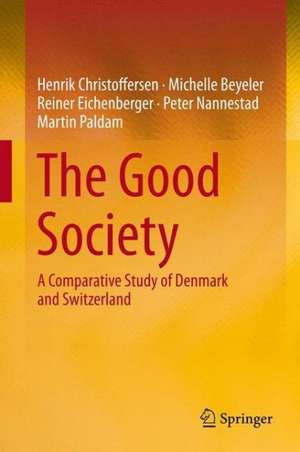The Good Society: A Comparative Study of Denmark and Switzerland
Autor Henrik Christoffersen, Michelle Beyeler, Reiner Eichenberger, Peter Nannestad, Martin Paldamen Limba Engleză Hardback – 11 dec 2013
| Toate formatele și edițiile | Preț | Express |
|---|---|---|
| Paperback (1) | 642.51 lei 6-8 săpt. | |
| Springer Berlin, Heidelberg – 3 sep 2016 | 642.51 lei 6-8 săpt. | |
| Hardback (1) | 648.89 lei 6-8 săpt. | |
| Springer Berlin, Heidelberg – 11 dec 2013 | 648.89 lei 6-8 săpt. |
Preț: 648.89 lei
Preț vechi: 763.40 lei
-15% Nou
Puncte Express: 973
Preț estimativ în valută:
124.16€ • 129.99$ • 102.74£
124.16€ • 129.99$ • 102.74£
Carte tipărită la comandă
Livrare economică 05-19 aprilie
Preluare comenzi: 021 569.72.76
Specificații
ISBN-13: 9783642372377
ISBN-10: 3642372376
Pagini: 320
Ilustrații: XII, 327 p. 67 illus.
Dimensiuni: 155 x 235 x 25 mm
Greutate: 0.65 kg
Ediția:2014
Editura: Springer Berlin, Heidelberg
Colecția Springer
Locul publicării:Berlin, Heidelberg, Germany
ISBN-10: 3642372376
Pagini: 320
Ilustrații: XII, 327 p. 67 illus.
Dimensiuni: 155 x 235 x 25 mm
Greutate: 0.65 kg
Ediția:2014
Editura: Springer Berlin, Heidelberg
Colecția Springer
Locul publicării:Berlin, Heidelberg, Germany
Public țintă
ResearchCuprins
Preface.- 1 Introduction.- Part I: The Quality of Life in Two Different Good Societies: Denmark and Switzerland.- 2 Two Wealthy Economies and Their Development.- 3 Are the Standards of Living Similar or Dissimilar?- 4 Happiness in Denmark and Switzerland.- Part II: Two Models of Good Societies.- 5 Two Stylized Economic Models.- 6 Political Institutions and Politics.- 7 Civil Society.- 8 Two Variants of the Welfare State.- 9 Immigration.- Part III: Challenges for the Two Good Societies.- 10 The Future of the Danish Welfare State.- 11 The Future of the Swiss Welfare State.- 12 Conclusion.
Notă biografică
Henrik Christoffersen is an associate external Professor in economics at the University of Copenhagen and Director of research at the Copenhagen Center for Political Studies, Cepos.
Michelle Beyeler is a senior researcher and lecturer at the Political Science Department of the Universities of Bern and Zurich. She is a political scientist and her research covers various topics such as comparative welfare state analysis, gender and politics, comparative political economy, and political protest.
Reiner Eichenberger is Professor at the University of Fribourg for Public Finance and Economic Policy since 1998. He got his doctorate (1991) and habilitation (1998) at the University of Zurich. He specializes in Political Economy and Institutional Innovations, and is a co-editor of Kyklos. He published more than 100 academic articles and a large number of contributions in outlets for the general public.
Peter Nannestad is Professor of Public Policy at the Department of Political Science at Aarhaus University since 1991.
Martin Paldam is Professor of Economics at the Department of Economics and Business at Aarhus University, Denmark.
Michelle Beyeler is a senior researcher and lecturer at the Political Science Department of the Universities of Bern and Zurich. She is a political scientist and her research covers various topics such as comparative welfare state analysis, gender and politics, comparative political economy, and political protest.
Reiner Eichenberger is Professor at the University of Fribourg for Public Finance and Economic Policy since 1998. He got his doctorate (1991) and habilitation (1998) at the University of Zurich. He specializes in Political Economy and Institutional Innovations, and is a co-editor of Kyklos. He published more than 100 academic articles and a large number of contributions in outlets for the general public.
Peter Nannestad is Professor of Public Policy at the Department of Political Science at Aarhaus University since 1991.
Martin Paldam is Professor of Economics at the Department of Economics and Business at Aarhus University, Denmark.
Textul de pe ultima copertă
Denmark and Switzerland are small and successful countries with exceptionally content populations. However, they have very different political institutions and economic models. They have followed the general tendency in the West toward economic convergence, but both countries have managed to stay on top. They both have a strong liberal tradition, but otherwise their economic strategies are a welfare state model for Denmark and a safe haven model for Switzerland. The Danish welfare state is tax-based, while the expenditures for social welfare are insurance-based in Switzerland. The political institutions are a multiparty unicameral system in Denmark, and a permanent coalition system with many referenda and strong local government in Switzerland. Both approaches have managed to ensure smoothly working political power-sharing and economic systems that allocate resources in a fairly efficient way. To date, they have also managed to adapt the economies to changes in the external environment with a combination of stability and flexibility.
Caracteristici
Providing empirical answers on how to achieve a good society Highly relevant comparative study in political economy and welfare studies Bringing together work from economists and political scientists ? Includes supplementary material: sn.pub/extras

















